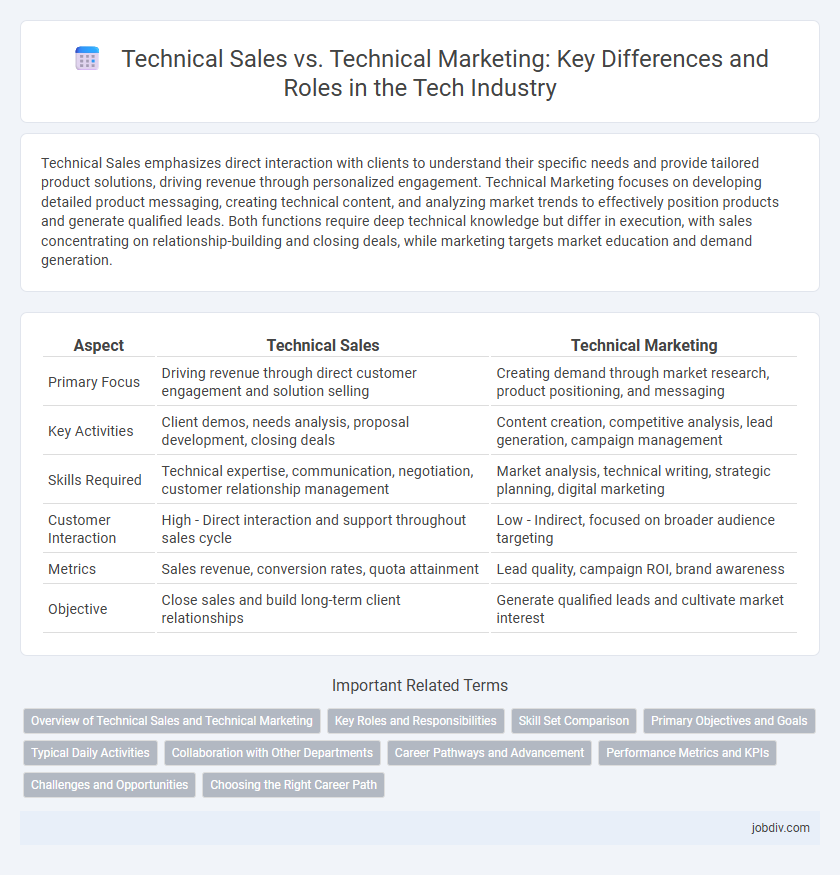Technical Sales emphasizes direct interaction with clients to understand their specific needs and provide tailored product solutions, driving revenue through personalized engagement. Technical Marketing focuses on developing detailed product messaging, creating technical content, and analyzing market trends to effectively position products and generate qualified leads. Both functions require deep technical knowledge but differ in execution, with sales concentrating on relationship-building and closing deals, while marketing targets market education and demand generation.
Table of Comparison
| Aspect | Technical Sales | Technical Marketing |
|---|---|---|
| Primary Focus | Driving revenue through direct customer engagement and solution selling | Creating demand through market research, product positioning, and messaging |
| Key Activities | Client demos, needs analysis, proposal development, closing deals | Content creation, competitive analysis, lead generation, campaign management |
| Skills Required | Technical expertise, communication, negotiation, customer relationship management | Market analysis, technical writing, strategic planning, digital marketing |
| Customer Interaction | High - Direct interaction and support throughout sales cycle | Low - Indirect, focused on broader audience targeting |
| Metrics | Sales revenue, conversion rates, quota attainment | Lead quality, campaign ROI, brand awareness |
| Objective | Close sales and build long-term client relationships | Generate qualified leads and cultivate market interest |
Overview of Technical Sales and Technical Marketing
Technical Sales involves direct interaction with customers to understand their needs, provide tailored product solutions, and close sales deals, emphasizing technical expertise and relationship management. Technical Marketing focuses on creating targeted campaigns, product positioning, and content that communicate complex technical features and benefits to drive market demand. Both functions require deep product knowledge but differ in customer engagement, with sales prioritizing one-to-one client interactions and marketing targeting broader audience segments.
Key Roles and Responsibilities
Technical Sales focuses on directly engaging customers to understand their technical needs, providing product demonstrations, and closing sales by aligning solutions with client requirements. Technical Marketing involves developing product positioning, creating technical content, and conducting market research to communicate value propositions effectively to target audiences. Both roles require strong technical knowledge, but Sales emphasizes customer interaction and revenue generation while Marketing prioritizes strategy and market analysis.
Skill Set Comparison
Technical Sales professionals excel in communication, customer relationship management, and in-depth product knowledge to tailor solutions that meet client needs and close deals effectively. Technical Marketing experts specialize in market research, competitive analysis, content creation, and campaign management to position products strategically and drive demand. Both roles require a strong understanding of technology but differ in execution; sales prioritize direct client interaction and negotiation while marketing focuses on messaging, brand awareness, and lead generation.
Primary Objectives and Goals
Technical sales prioritize converting leads into customers by demonstrating product functionality and addressing specific client needs through direct interaction. Technical marketing aims to generate demand and increase product awareness by crafting targeted content that highlights technical features and industry benefits. Both roles leverage deep product knowledge but focus respectively on closing deals versus shaping market perception and strategic communication.
Typical Daily Activities
Technical Sales involves direct client interactions, product demonstrations, and addressing customer requirements to drive sales conversions. Typical daily activities include preparing sales proposals, conducting technical presentations, and collaborating with engineering teams to tailor solutions. Technical Marketing focuses on market analysis, content creation such as whitepapers and case studies, and developing go-to-market strategies to support product adoption.
Collaboration with Other Departments
Technical sales and technical marketing teams collaborate closely with product development, engineering, and customer support to align product features with market demands and customer feedback. Sales teams provide direct insights from client interactions that help marketing tailor campaigns and technical content to specific customer needs. Marketing supplies sales with detailed competitive analysis and targeted messaging strategies to enhance lead generation and conversion rates.
Career Pathways and Advancement
Technical sales professionals leverage deep product knowledge and customer insights to drive revenue growth, often advancing towards roles in sales management, business development, or customer success leadership. Technical marketing specialists focus on product positioning, market analysis, and demand generation, progressing into strategic roles such as product management, marketing director, or chief marketing officer (CMO). Both career paths require continuous skill enhancement in technical expertise and communication, with opportunities to transition between technical sales and marketing for broader career development.
Performance Metrics and KPIs
Technical sales metrics prioritize conversion rates, sales cycle length, and average deal size to evaluate revenue generation efficiency. Technical marketing KPIs emphasize lead quality, campaign ROI, and engagement rates to measure brand impact and demand creation. Aligning these metrics drives cohesive strategies that optimize both customer acquisition and market positioning.
Challenges and Opportunities
Technical sales faces challenges in translating complex product features into customer-ready benefits, often requiring deep industry knowledge and customer engagement skills. Technical marketing focuses on positioning and communicating product value through targeted campaigns, leveraging data analytics and market research to overcome competitive pressures. Both fields offer opportunities for innovation by integrating sales feedback with marketing strategies to enhance product development and customer experience.
Choosing the Right Career Path
Choosing between Technical Sales and Technical Marketing hinges on aligning your skills with job functions: Technical Sales requires strong interpersonal and negotiation abilities to directly influence client purchase decisions, while Technical Marketing emphasizes product strategy, market analysis, and communication to boost brand presence and demand generation. Both careers demand deep technical knowledge but diverge in daily activities--sales professionals focus on customer engagement and closing deals, whereas marketers work on campaign development and market positioning. Evaluating personal strengths and career goals facilitates selecting the optimal path within the technology sector.
Technical Sales vs Technical Marketing Infographic

 jobdiv.com
jobdiv.com